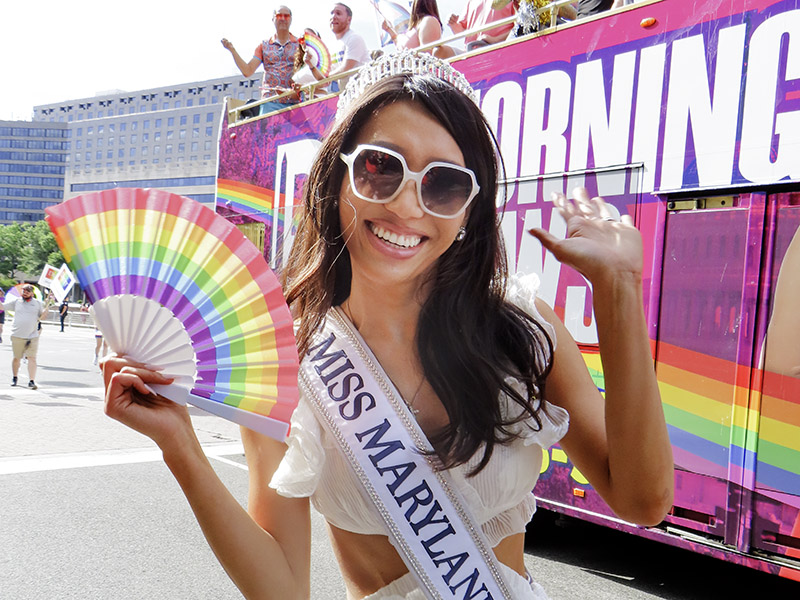NCAA Has No Plans To Ban Trans Athletes From Women’s Sports
Critics accuse the NCAA of backing away from its policy allowing governing sports bodies to create own eligibility criteria.

NCAA President Mark Emmert told a former Olympian that the governing body in collegiate athletics has no plans to issue an explicit, across-the-board ban prohibiting transgender females from competing in women’s sports.
Emmert indicated that the NCAA has no plans to change its current rules, according to a letter he sent in response an inquiry from a former Olympian and multi-time NCAA champion, who shared the correspondence with Swimming World magazine, on the condition that the Olympian retain their anonymity.
Swimming World, whose editor-in-chief has previously railed, against transgender participation in women’s sports, then posted Emmert’s response on its website.
Earlier this year, the NCAA Board of Governors approved new guidelines, which deferred to the national governing body of each sport to determine its own criteria regarding the eligibility of transgender athletes seeking to compete on teams that match their gender identity.
If a sport does not have a national governing body, or the body does not have a written policy on transgender athletes, the sport’s international federation policy will determine eligibility. If there is no international federation policy, eligibility would be determined by following International Olympic Committee standards.
The new guidelines were not expected to be fully implemented until the start of the 2023-2024 academic year, although starting in the fall of 2022, trans athletes will have to provide documentation showing that the levels of testosterone in their blood are below the standards set by each governing body at the beginning of their season, and six months after the start of their season.
Soon after the NCAA’s announcement, USA Swimming, the governing body for competitive swimming, adopted stringent requirements — primarily motivated by the participation of UPenn swimmer Lia Thomas at the 2022 NCAA championships, where she won gold in the 500-yard freestyle but failed to medal in two other events.
Under the requirements adopted by USA Swimming, transgender females must go before a three-person panel of independent medical experts, who will determine — based on individual characteristics — whether a swimmer’s prior physical development in puberty gives them a competitive advantage over cisgender female competitors.The swimmer in question must also provide bloodwork showing that the concentration of testosterone in her blood has been less than 5 nanomoles per liter continuously for a period of at least 36 months.
The policy does not mention any requirements for transgender male athletes wishing to continued competing on women’s teams, although ostensibly the same bloodwork criteria would apply, to ensure that the athlete has not started hormone therapy. There are no requirements at all for trans males seeking to compete in male-designated swimming events.
But critics claim the NCAA backed away from its guidelines after USA Swimming adopted the more stringent eligibility requirements, allowing Thomas to compete under its old policy, which only required trans females to undergo a year of testosterone suppression prior to competing.
Other critics wanted the NCAA to take a firmer stance preventing all transgender females from competing in women’s sports altogether, arguing that, regardless of testosterone levels, transgender women who have undergone male puberty enjoy physical advantages that cisgender females do not, and allowing them to compete is inherently unfair.
In his letter to the anonymous Olympian, Emmert wrote that the NCAA Board of Governors “firmly and unequivocally supports the opportunity for transgender student-athletes to compete in college sports.”
“We understand there are differing views on transgender student-athlete participation in sport[s],” he wrote. “The NCAA’s current policy is anchored in the evolving science on this issue and in the sport-specific policies of the U.S. Olympic and Paralympic Committee’s national governing bodies, of international federations and of the International Olympic Committee when relevant.
“Further, the policy provides the Board of Governors and the Committee on Competitive Safeguards and Medical Aspects of Sports the opportunity to review and approve each policy to ensure it aligns with the core values of the NCAA. The resulting sport-by-sport approach preserves opportunities for transgender student-athletes while balancing fairness, inclusion and safety for all who compete.
“The NCAA Board of Governors expects that all student-athletes will be treated with dignity and respect. We are committed to ensuring that NCAA championships are open for all who earn the right to compete in them. As your letter illustrates, this is an important topic, and the NCAA Committee on Competitive Safeguards and Medical Aspects of Sports along with the Board of Governors will continue to monitor the issue and recommend adjustments to the policy as needed.”
As negative reactions to Thomas’ win have demonstrated, and as more and more states push forward with bills banning high school and collegiate transgender-student athletes from competing in female-designated sports, it is becoming clearer that for many, anything short of an across-the-board prohibition on transgender athletes competing — or establishing “separate-but-equal” events where transgender people only compete against each other, as Fox News host Harris Faulkner proposed during a recent broadcast — will be viewed as unacceptable.
Support Metro Weekly’s Journalism
These are challenging times for news organizations. And yet it’s crucial we stay active and provide vital resources and information to both our local readers and the world. So won’t you please take a moment and consider supporting Metro Weekly with a membership? For as little as $5 a month, you can help ensure Metro Weekly magazine and MetroWeekly.com remain free, viable resources as we provide the best, most diverse, culturally-resonant LGBTQ coverage in both the D.C. region and around the world. Memberships come with exclusive perks and discounts, your own personal digital delivery of each week’s magazine (and an archive), access to our Member's Lounge when it launches this fall, and exclusive members-only items like Metro Weekly Membership Mugs and Tote Bags! Check out all our membership levels here and please join us today!


























You must be logged in to post a comment.